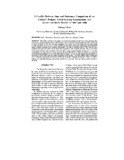A conflict between aims and outcomes: comparison of one cohort’s primary school leaving examinations and junior certificate results of 2003 and 2006

View/
Date
2010-03Author
Pheko, B.C.
Publisher
Kamla-Raj Enterprises, http://www.krepublishers.comRights holder
Kamla-Raj EnterprisesType
Published ArticleMetadata
Show full item recordAbstract
The primary objective of this paper is to evaluate the outcomes of the 10 year- basic
education policy in Botswana through comparison of one cohort national results of School Leaving
Examination (PSLE) of 2003 and its Junior Certificate (JC) of 2006. The main assumptions of this policy are that all children will have gone through a quality education. The PSLE (2003) results indicate that
most pupils passed their examinations and proceeded to junior secondary education level. However, the problem is that the JC national results of 2006 show that most completers have poor results which do not allow them to proceed to senior secondary education. This is an indication of poor quality
education. The observation is that class sizes at junior secondary education are huge (45 - 51) and
there are inadequate teaching resources at junior secondary education. The Ministry of Education should take cognizance of the educational problems at this level and make efforts to reduce class size,
provide adequate teaching resources so that teachers could be able to give each student the attention
she/he deserves. These have affected students’ performances and it is therefore important for the
Ministry of Education to introduce Regional examinations at Form 2 in order to monitor each individual
performance and provide remedial if it is necessary. These may improve quality education at this level.
